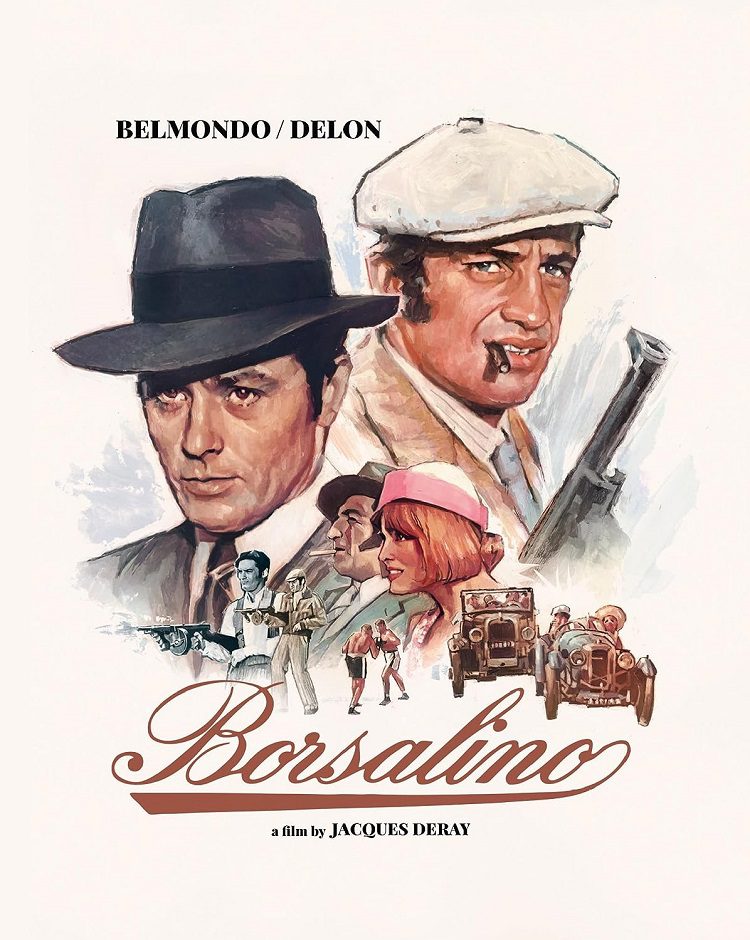
Alain Delon and Jean-Paul Belmondo were two of the biggest and greatest film stars in France. They were both great actors, incredibly charismatic, and well, let’s be honest quite attractive. They are two of my favorites. I love that they are both quite different from one another. Delon is classically gorgeous white Belmondo with his large nose and slightly cock-eyed face is more ruggedly handsome. Belmondo, with his boisterous personality and great physicality, was a larger-than-life presence on screen, whereas Delon tended to be more reserved, exuding a quiet cool. I love them both. Audiences did as well for they remained two of the most popular stars in France for several decades.
Which is why putting them in a film together is always quite exciting. Especially in a gangster picture – a genre that helped give both of them their first successes and which they would repeatedly return to over both their careers. It is also why Borsalino winds up feeling like a disappointment.
Made in 1970, Borsalino is a throwback to the Universal Studios gangster pictures from the 1930s, but it can’t help but be compared to a different type of gangster picture made just two years later, The Godfather. That film changed the gangster film forever and even though Borsalino was made before The Godfather, it still feels diminished by it. Borsalino does point towards what The Godfather accomplished in that with a two-hour run time it is more epic in scope than those old Warner Brothers films. But it can’t quite accomplish what it sets out to do – tell the epic story of two small-time crooks who rise through the ranks to become the bosses of Marseilles.
It begins with Roch Siffredi (Delon) being released from prison. He immediately goes looking for his girl and finds that she has attached herself to François Capella (Belmondo). They fight over her but neither of their hearts seems to be in it. The filmmaking emulates the style of those old gangster pictures and you can see where the actors throw their punches or completely miss one another. The characters seem to go after it out of some sense of duty, but it isn’t a knock-down, drag-out brawl. It ends essentially in a tie. Both men look at each other with a wry smile then slump to the ground exhausted.
Afterward, they become fast friends and begin a partnership of light crime. They fix fights and horse races. At first, they are just having fun, making a little money. It is nothing serious, but it’s better than real work. But then Rinaldi (Michel Bouquet) approaches them and things quickly get complicated. Rinaldi is a lawyer who works for Poli (André Bollet), who runs most of Marseilles’ crime rackets. He tasks the men with taking over the fish markets, which are run by Mirello (Arnoldo Foà), the other crime boss in town. They make a game of it, taking some old, rotten fish and slipping them into the market stalls and customer baskets. It works. It also gives them a taste of something more – power and real money.
From there, they get serious about their criminal activities. And ambitious. If they can take over the fish markets, why not the meat market run by Poli? Why can’t they take over the entire town? If you’ve seen any gangster picture ever, then you know where this goes – they keep climbing higher until they are brought down.
It really does feel like a movie caught between the early gangster films starring guys like James Cagney and Edward G. Robinson and the later, post-Godfather epics that use the mafia as a means to speak about the failure of the American Dream. In the first half of the film, when Capela and Sifredi are just getting started the filmmaking is light and fun. The music emulates the jaunty piano twinkling of old western saloons. About the time they try to take over the meat market, things turn more dramatic, more sinister.
That scene in the meat market is the film’s best scene. They pour gasoline onto the slabs of meat hanging in the enormous locker, lighting them on fire. Then Poli’s men unleash their bullets. A gunfight amongst hanging burning cow carcasses is not an image I’ll soon forget.
From there, the film periodically returns to its original jollity, but only in spots. Our heroes have reached the point of no return. There is a moment in that meat locker where Capella uses his gun to shoot someone. The look on his face indicates he realizes there is no going back. He’s likely never killed someone before, perhaps he never intended to. But now that he has, he’s set his path.
Sifreddi is a man who is never satisfied. Late in the film, he is standing outside his large, gaudy mansion, with more money than he can ever spend and countless women at his disposal, yet he looks so sad. He wants more. He wants it all. Even when he gets it, it isn’t enough. So it is with men of his type. So it is with films such as this.
It never does capture the epic scale it seems to (sometimes) be going for. Yet in its jauntier moments, it doesn’t feel as light as it needs to. The middle ground it winds up straddling is not all that compelling. There are some wonderful moments like the scene in the meat locker or a moment when the two men are swimming on the beach. Delon and Belmondo are always magnetic to watch; I just wish the rest of the film had more to say.
Arrow Video presents Borsalino with a nice-looking 1080p transfer and both French and English audio tracks. Extras include an audio commentary from Josh Nelson, featurettes on the film’s music and costumes, and an archival documentary on Jean-Paul Belmondo’s career. Plus a booklet featuring essays on the film, a poster, and six postcard-sized art cards.